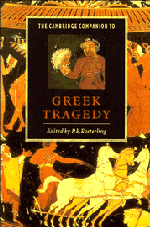Book contents
- Frontmatter
- Part I Tragedy as an institution
- Part II The plays
- Part III Reception
- 9 From repertoire to canon
- 10 Tragedy adapted for stages and screens
- 11 Tragedy in performance: nineteenth- and twentieth-century productions
- 12 Modern critical approaches to Greek tragedy
- Glossary
- Chronology
- Texts, commentaries and translations
- Works cited
- Index
10 - Tragedy adapted for stages and screens
from Part III - Reception
Published online by Cambridge University Press: 28 May 2006
- Frontmatter
- Part I Tragedy as an institution
- Part II The plays
- Part III Reception
- 9 From repertoire to canon
- 10 Tragedy adapted for stages and screens
- 11 Tragedy in performance: nineteenth- and twentieth-century productions
- 12 Modern critical approaches to Greek tragedy
- Glossary
- Chronology
- Texts, commentaries and translations
- Works cited
- Index
Summary
A history of the influence of Greek tragedy on later Western literature and thought, if it could be written at all, would be not only enormously long but also extremely complicated. Given the cultural prestige of tragedy, however, it is striking how rarely the plays themselves were brought to the stage until relatively recent times. The extraordinary beginning made with the production of Sophocles' Oedipus the King at Vicenza in 1585 remained a more or less isolated event until the end of the eighteenth century, and indeed it is only in the last few decades that productions of Greek tragedy have become common occurrences (see Ch. 11). What did happen, and on a large scale, was the adaptation of tragic plots to create a new corpus of dramatic texts, more often than not the product of 'contamination' with Senecan tragedy, and drawing on historical and mythological lore from non-tragic sources as well as current religious, philosophical, and political ideas.
This chapter confronts some of the intellectual and aesthetic issues involved in the process of coming to terms with Greek tragedy over the last five centuries. I limit myself largely to plays and operas (and, in the final paragraphs, films and television) that are clearly based on extant Greek originals, not because these plays are necessarily of the highest literary or cultural importance in and of themselves (though no doubt a number are), but because they suggest in obvious ways the challenge that adapters from the Renaissance onwards faced in assimilating a particularly prestigious but in many ways intractable heritage.
- Type
- Chapter
- Information
- The Cambridge Companion to Greek Tragedy , pp. 228 - 283Publisher: Cambridge University PressPrint publication year: 1997
- 12
- Cited by



